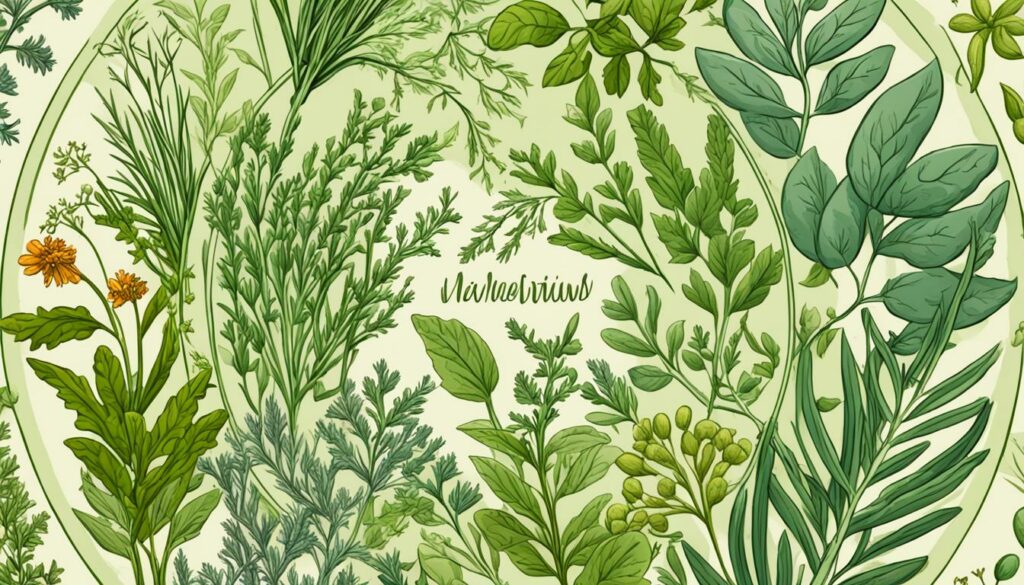Have you ever wondered if there is a natural way to promote your overall well-being without relying solely on synthetic drugs? Are you curious about the power of holistic herbs in providing effective and safe remedies? It’s time to explore the world of herbal medicine and discover the wonders of alternative healing. In this guide, we’ll take you on a journey through the realm of holistic herbs, revealing their potential to enhance your health and vitality. From chamomile to ginseng, these wellness herbs have been trusted by ancient civilizations for thousands of years. So, are you ready to unlock the secrets of holistic herbs and experience the benefits of natural remedies? Let’s dive in!
The Benefits of Holistic Herbs
Holistic herbs offer a range of benefits for overall well-being. Organic herbs, in particular, are free from pesticides and other harmful chemicals, ensuring their purity and effectiveness. Incorporating holistic herbs into your wellness routine promotes holistic wellness, addressing physical, mental, and emotional health.
Herbal supplements, derived from these herbs, provide concentrated doses of their medicinal properties. They can be taken in various forms, such as teas, tinctures, capsules, or salves. Holistic herbs support the immune system, reduce inflammation, promote relaxation, improve digestion, relieve pain, and support various organ functions. They are a natural, gentle, and sustainable way to enhance your health and well-being.

“Incorporating holistic herbs into your wellness routine promotes holistic wellness, addressing physical, mental, and emotional health.”
Incorporating organic herbs into your wellness routine helps you tap into the power of nature to support your overall well-being. Whether you are looking to boost your immune system, reduce stress, or improve digestion, there is an herbal supplement that can help. By choosing organic herbs, you can ensure that you are getting the purest and most potent form of these natural remedies.
The Advantages of Organic Herbs:
- Free from pesticides and harmful chemicals
- Greater purity and effectiveness
- Sustainable and environmentally friendly
- Support holistic wellness
Promoting Holistic Wellness:
- Supports the immune system
- Reduces inflammation
- Promotes relaxation and reduces stress
- Improves digestion
- Relieves pain
- Supports various organ functions
By incorporating holistic herbs into your daily routine, you can experience the many benefits they have to offer. Start exploring the world of herbal supplements and discover how they can enhance your health and well-being in a natural and holistic way.
Growing and Using Holistic Herbs
Growing your own holistic herbs allows you to have a sustainable and convenient supply of fresh herbs. Many herbs can be easily grown in containers or gardens, requiring minimal space and maintenance. Some beginner-friendly herbs include mint, basil, parsley, rosemary, and thyme. To successfully grow herbs, provide them with plenty of sunlight, well-drained soil, and regular watering.
Once you have grown your own herbs, you can incorporate them into your everyday life. Make herbal teas by steeping fresh or dried herbs in hot water. Use herbal tinctures to add herbal extracts to water or take them directly. Integrate herbs into your cooking for added flavor and health benefits. Create herbal salves and balms for skincare. Explore the aromatic benefits of essential oils for aromatherapy and massage.

Holistic Herbs for Common Ailments
Holistic herbs offer natural remedies for common ailments. Incorporating these herbs into your wellness routine can provide effective relief without the side effects often associated with synthetic medications. Here are some key holistic herbs and their benefits:
Ginger
Ginger is commonly used for nausea, indigestion, and motion sickness. It has been shown to help alleviate symptoms and promote digestive health.
Echinacea
Echinacea is known for boosting the immune system and helping to prevent colds and flu. It enhances the body’s natural defense mechanisms and supports overall immune health.
Valerian Root
Valerian root is a natural sedative that aids in anxiety, stress, and insomnia. It promotes relaxation, calms the mind, and helps improve sleep quality.
Turmeric
Turmeric has powerful anti-inflammatory and antioxidant properties. It can help reduce inflammation in the body, relieve pain, and support overall joint and cardiovascular health.
Lavender
Lavender is known for its calming and soothing effects. It promotes relaxation, reduces stress and anxiety, and can improve sleep quality.
These holistic herbs can be consumed as teas, added to food, or taken as supplements. However, it’s important to note that individual experiences may vary. Consulting with a healthcare professional is recommended to ensure proper usage and dosage for your specific needs.
Consider incorporating these natural remedies into your wellness routine to support your overall health and well-being.
Integrating Holistic Herbs into Your Wellness Journey
Discover the incredible benefits of herbal remedies and incorporate the power of herbs into your daily routine to enhance your overall health and well-being. By following recommended dosages and instructions, you can harness the incredible healing properties of holistic herbs for specific health concerns.
One way to integrate herbs into your daily life is by making herbal teas. Infusing your favorite herbs in hot water creates a soothing and therapeutic beverage that supports your wellness journey. Additionally, using herbal tinctures allows you to add herbal extracts directly to water or incorporate them into other liquids for a convenient and potent herbal remedy.
Don’t limit yourself to beverages; embrace the versatility of herbs by adding them to your cooking. Whether it’s a sprinkle of fresh herbs or the inclusion of dried herbs in your recipes, incorporating herbs into your meals not only enhances the flavors but also brings their medicinal benefits to your plate.
Expand your holistic herb experience further by crafting your own herbal skincare products. Utilize the nourishing properties of certain herbs to create salves, balms, or creams for natural skincare remedies. Explore the aromatic benefits of essential oils extracted from herbs for aromatherapy and massage, bringing relaxation and rejuvenation to your self-care routine.
To fully connect with nature and appreciate the healing properties of holistic herbs, consider growing your own herb garden. This allows you to cultivate a sustainable supply of fresh herbs and develop a deeper relationship with the plants. Gardening encourages mindfulness and provides an opportunity for self-care as you witness the growth and transformation of your herbal allies.
While herbs offer numerous benefits, it’s essential to consult with healthcare providers before starting any new herbal regimen, particularly if you are taking other medications. They can guide you in utilizing holistic herbs safely and effectively to support your natural well-being goals.
Integrating herbal remedies and incorporating herbs into your daily routine opens up a world of holistic wellness possibilities. Embrace the power of nature and embark on a journey towards enhanced health and well-being with the help of these incredible gifts from the earth.

